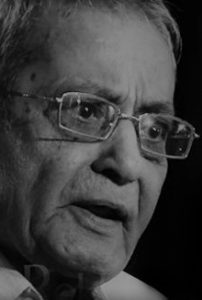 Muhammad Alvi
Muhammad Alvi
(Muḥammad ʻAlvī)
1927 – 2018
 Muhammad Alvi
Muhammad AlviMuhammad Alvi (Muḥammad ʻAlvī; 1927-2018; also Alavi) was born in Ahmedabad, where he received his early education. A graduate of Jamia Milia Islamia, Delhi, he has published five collections of poems: Khālī makān (Empty House; 1963), Āk̲h̲irī din kī talāsh (Search for the Last Day; 1967), Tīsrī kitāb (Third Book; 1978), Cauthā āsmān (Fourth Heaven; 1991). for which he received the 1992 Urdu Sahitya Akademi Award, and Rāt idhar udhar raushan (Night Here, There Light; 1995).
Alvi is especially notable for the simplicity of his poems. They often tend to be short in length, such as “Afvāhen̲” (Rumours)* and “Ek burī k̲h̲abr” (Bad News)*; even the length of lines is often slim, sleek, maybe one word, or two or three, as in “Ek manẓar” (A Scene).* The language of the poem is often understated, the tone relaxed, casual; its narrative is quotidian just up to the end, then shifts, as in “Machlī kī bū” (Smell of Fish),* in which a successful, self-satisfied, upbeat fellow in bed at night carefully plans, in a mixture of Urdu and English, his next day’s routine, only to die in his sleep. Alvi also engages with the Almighty in his poems. In Āk̲h̲irī din kī talāsh,* he suggests that God is unfair for not letting us know when we will die. Or, “Jhūṭ” (Lie),* which concludes that “Whatever’s written in / The Book / is all a lie.”
It is thus no surprise that Alvi has tangled with the religious establishment in his poetry, most famously in 1994, when he wrote as part of a couplet addressed to Allah, “To acchā sā koī nabī bhej de” (So send some rather good prophet). On hearing of the couplet, the imam of the Great Mosque (Jama Masjid) in Ahmedabad issued a religious edict (fatwā) excommunicating the poet. Alvi eventually withdrew the couplet from publication, admitting that he probably should not have used the word nabī. Besides such exchanges, there is also humor in his poetry, wry, understated, as in “‘Bāʼen̲ ānkh men̲ tilvāle kī zabānī’” (“‘Testimony of the Man with a Dark Spot in His Left Eye’”).*
See Shamsur Rahman Faruqi, “Urdu: Against Totalization”; review of Cauthā āsmān, Indian Literature, 37:2 (1994) 187-94, and Muhammad Alvi, The Wind Knocks and Other Poems, tr. Bedar Bakht and Marie-Anne Erki (2007).
2. Ajīb k̲h̲vāhish / Strange Desires
3. Āk̲h̲irī din kī talāsh / Search for the Last Day
4. “Bāʼen̲ ānkh men̲ tilvāle kī zabānī”/ “Testimony of the Man with a Dark Spot in His Left Eye”
8. Havā sard hai / Wind Is Cold
11. Machlī kī bū / Smell of Fish
12. Machlīan̲ kaun khā gayā / Who’d Eaten the Fish?
13. Mujhe un jazīron̲ men̲ le jā’o / Take Me to Those Islands
15. Ūdaipūr palis / Udaipur Palace
From: Āk̲h̲irī din kī talāsh (Search for the Last Day). Allāhābād: Shabk̲h̲ūn Kitāb G̲h̲ar, 1968.
Further Reading:
Faruqi, Shamsur Rahman. “Against Totalization.” Indian Literature. 37:2. 1994. 187-94. Review of Muhammad Alvi’s Cauthā āsmān (Fourth Heaven; 1992).

